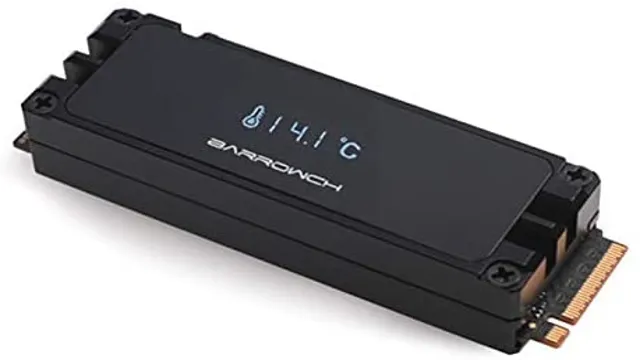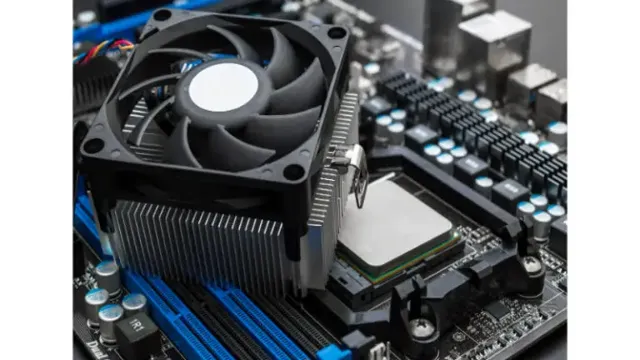If you’re in the market for a new processor, you may be wondering whether or not you need a heatsink. A heatsink is a component that helps to dissipate heat from your CPU, helping to prevent it from overheating and causing damage. While some CPUs come with a built-in heatsink, others do not, leaving buyers to purchase one separately.
In this blog post, we’ll take a closer look at whether or not you actually need a heatsink and why it might be worth investing in one for your system. So, grab a cup of coffee, sit back, and let’s dive in!
What is a Heatsink?
If you’ve ever built a computer or made any upgrades to one, you may have heard of a heatsink. But what exactly is a heatsink and why do you need one? A heatsink is a physical device that is used to cool down electronic components, primarily the central processing unit (CPU) of a computer. It typically consists of a metal piece with fins or ridges that help dissipate the heat generated by the component it is attached to.
The main purpose of a heatsink is to prevent the component from overheating, which can cause damage and reduce its longevity. So, do you need a heatsink? If you’re using a computer with a high-performance CPU, the answer is likely yes. Without a heatsink, the CPU can quickly heat up and shut down or cause permanent damage.
However, if you’re using a low-power CPU or one that comes with a built-in heatsink, you may not need to purchase an additional one. Overall, it’s important to ensure that your electronic components are properly cooled, and a heatsink is a great way to achieve that.
Function and Importance of Heatsink
A heatsink is a small component designed to help regulate temperature and dissipate heat from electronic devices. It typically consists of a metal plate with fins that increase its surface area, allowing for better heat transfer. Heatsinks are commonly used in computers, smartphones, and other electronics that generate a lot of heat.
The function of a heatsink is critical in preventing electronic devices from overheating, which can cause damage to the internal components and shorten their lifespan. Without a heatsink, the internal temperature of electronic devices could rise to dangerous levels, leading to malfunctions or even fires. In short, heatsinks are essential components in the design and manufacture of electronic devices, ensuring that they function properly and last as long as possible while keeping temperatures under control.

Factors to Consider When Choosing a Heatsink
If you are wondering if you need a heatsink, the answer is generally yes if you are dealing with electronic devices that generate heat. A heatsink is a simple device that helps to dissipate heat away from a component to avoid damage due to overheating. When choosing a heatsink, there are several factors to consider.
First, you need to know the amount of heat being generated by the component you want to cool. This will help you determine the size and type of heatsink you need. Other factors to consider include the airflow in the area surrounding the heatsink, the mounting method, and the thermal conductivity of the materials used.
It’s also essential to consider the overall design and aesthetics of the device, especially if it’s for consumer electronics. By taking these factors into account, you can choose the best heatsink for your needs.
CPU Usage
When it comes to managing CPU usage, choosing the right heatsink is crucial. There are several factors to consider before making a decision. Firstly, you should look at the size of your processor as heatsinks come in a range of sizes and some may be too big or small for your CPU.
It’s also important to consider the type of CPU you have, as some may require a more powerful heatsink than others. Another important factor is the noise level of the heatsink as some can be much louder than others, which can be distracting if you’re trying to work or game. Lastly, you should consider the price and whether it fits within your budget.
It’s important not to skimp on this component as it plays a crucial role in keeping your CPU cool and preventing overheating. Overall, taking these factors into consideration will help you choose the right heatsink for your needs and ensure smooth and efficient CPU usage.
Heat Output
One of the most critical factors to consider when choosing a heatsink is heat output. Heat output refers to the amount of heat energy generated by an electronic component when it is in operation. Different components produce varying levels of heat output, which makes it essential to choose a heatsink that can effectively dissipate the heat generated.
To choose the right heatsink, it is essential to consider a few factors, including the size of the component in question, the material used to manufacture the heatsink itself, and the airflow around the component. Having a heatsink that matches the heat output of the component ensures that the device doesn’t overheat, which could lead to permanent damage or a shorter lifespan. Therefore, it’s crucial to select a heatsink that can dissipate heat efficiently and keep your device running smoothly.
Size and Shape of your System
When choosing a heatsink for your system, the size and shape of your system are important factors to consider. The size of your heatsink depends on the size of your motherboard, the space available in your case, and the amount of heat that needs to be dissipated. A larger heatsink may be necessary for a larger system or one that generates more heat, while a smaller heatsink may be sufficient for a smaller system.
The shape of your heatsink also matters, as some shapes are more efficient at dissipating heat than others. For example, a finned heatsink allows for more surface area and better airflow, whereas a block heatsink has less surface area and relies on convection. Ultimately, the size and shape of your heatsink should be chosen based on the specific needs of your system and the components it contains.
Don’t forget to consider the airflow in your case as well, as poor airflow can reduce the effectiveness of even the best heatsinks. So, when looking for a heatsink, consider the size, shape, and airflow of your system to choose the best option for your needs.
Benefits of Using a Heatsink
Do you need a heatsink? Well, first, let’s understand what a heatsink is. It is a passive cooling device that absorbs and dissipates the heat generated by electronic components, such as CPUs and graphics cards. One of the main benefits of using a heatsink is that it increases the lifespan of the electronic components.
When components get too hot, they tend to become unstable and can fail prematurely. A heatsink ensures that the heat generated is removed, keeping the temperature within optimal levels, thus extending the life of your electronic device. Additionally, a heatsink can help reduce noise levels, as it prevents the need for noisy cooling fans.
It can also improve the overall performance of your device, as it allows it to operate at a higher capacity without overheating. So, if you want to protect your electronic devices, increase their performance, and reduce noise levels, a heatsink is definitely worth considering.
Improved Performance
When it comes to electronic devices, overheating can cause serious problems such as reduced performance, shortened lifespan, and even total failure. Thankfully, using a heatsink can help to dissipate the excess heat and improve the performance of your device. A heatsink is a simple device that is designed to transfer heat away from the source to the surrounding environment.
By doing so, it helps to keep the device running at a cooler temperature, which in turn leads to improved performance and longer lifespan. Think of it like a car’s radiator – when the engine gets too hot, the radiator helps to remove the excess heat and keep things running smoothly. The same principle applies to electronic devices like computers and smartphones.
By using a heatsink, you can ensure that your device runs at optimal levels and avoids the negative consequences of overheating. So whether you’re a gamer, a professional or just a casual user, investing in a heatsink can be a wise decision and pay off in the long run.
Longer Lifespan of your System
If you want to prolong the lifespan of your computer system, it’s crucial to consider using a heatsink. Heatsinks have been proven to be beneficial in increasing the longevity of computer systems. Not only do heatsinks help regulate the temperature of the system by dissipating heat away from the critical components such as the CPU and the GPU, but they also prevent overheating, which can cause damage and eventually lead to system failure.
Additionally, heatsinks reduce the workload on the computer’s internal fans, making them work more efficiently, and ultimately increasing the lifespan of the entire system. So, if you want to maximize the performance and lifespan of your computer system, investing in a heatsink is an excellent decision that you won’t regret.
Conclusion
Ultimately, the decision of whether or not you need a heatsink depends on how hot and bothered you want your computer to be. Just like how sunburns are a tell-tale sign of too much heat exposure, overheating components can cause irreparable damage to your system. So, unless you enjoy the sizzle and pop of fried electronics, investing in a proper heatsink is always the cooler choice.
“
FAQs
What is a heatsink?
A heatsink is a component that helps dissipate heat from a computer’s central processing unit (CPU) or graphics processing unit (GPU).
Do all computer parts need a heatsink?
No, not all computer parts require a heatsink. CPUs and GPUs generate the most heat, so they typically require a heatsink, but other components may not.
Can I use a stock heatsink for my CPU?
Yes, most CPUs come with a stock heatsink that is sufficient for basic use. However, if you plan on overclocking or using your computer for intense tasks, it may be beneficial to invest in a better quality heatsink.
How do I know if my CPU needs a larger heatsink?
If your computer is overheating or shutting down unexpectedly, it may be a sign that your CPU needs a larger heatsink. Additionally, if you plan on overclocking your CPU, a larger heatsink may be necessary to prevent overheating.
